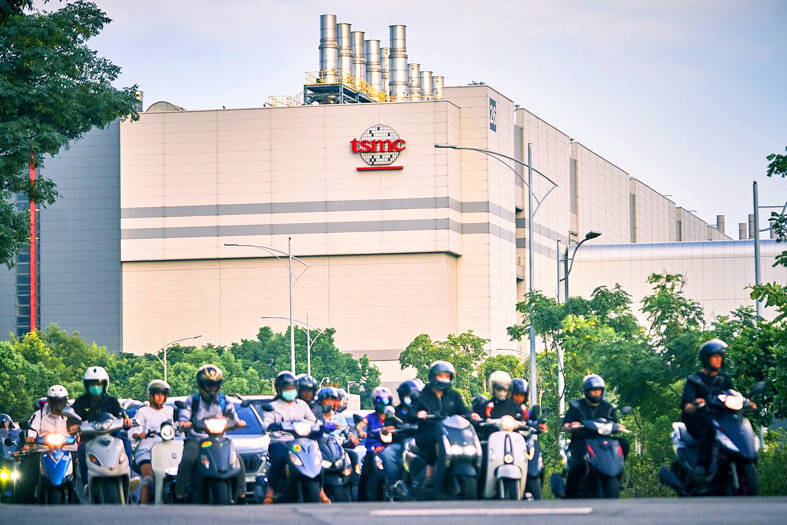Taiwan Semiconductor Manufacturing Co (TSMC, 台積電) on Saturday said that it has received a total of NT$62.5 billion (US$1.95 billion) in subsidies from China and Japan since 2022.
In the first half of this year, TSMC received NT$7.96 billion in subsidies from China and Japan after receiving about NT$47.55 billion last year and obtaining NT$7.05 billion in 2022, financial data compiled by the world’s largest contract chipmaker showed.
The company, which makes about 90 percent of the world’s high-end semiconductors, said the subsidies were used to finance its investments in Kumamoto, Japan, and Nanjing, China.

Photo: An Rong Xu, Bloomberg
TSMC owns a 12-inch wafer fab in Nanjing and officially opened a 12-inch fab on Feb. 24 in Kumamoto.
The chipmaker said it plans to build another advanced facility in Kumamoto, with operations scheduled to begin in 2027.
TSMC has also extended its reach to Germany and the US.
On Tuesday, the company broke ground on a 12-inch wafer fab in Dresden, Germany. European Commission President Ursula von der Leyen said the commission contributed 5 billion euros (US$5.6 billion) in state aid toward the project.
In the US, TSMC is building two advanced fabs in Arizona and plans to build a third fab there, with total investments expected to be more than US$65 billion.
TSMC has not received any subsidies from the US government yet, even though the US Department of Commerce announced in April that it had signed a non-binding preliminary memorandum of terms with TSMC for up to US$6.6 billion in direct funding.
As overseas investments would increase the chipmaker’s operating costs, TSMC said it would adopt flexible pricing strategies based on higher costs abroad to achieve a long-term goal of no less than a gross margin of 53 percent.

MULTIFACETED: A task force has analyzed possible scenarios and created responses to assist domestic industries in dealing with US tariffs, the economics minister said The Executive Yuan is tomorrow to announce countermeasures to US President Donald Trump’s planned reciprocal tariffs, although the details of the plan would not be made public until Monday next week, Minister of Economic Affairs J.W. Kuo (郭智輝) said yesterday. The Cabinet established an economic and trade task force in November last year to deal with US trade and tariff related issues, Kuo told reporters outside the legislature in Taipei. The task force has been analyzing and evaluating all kinds of scenarios to identify suitable responses and determine how best to assist domestic industries in managing the effects of Trump’s tariffs, he

TIGHT-LIPPED: UMC said it had no merger plans at the moment, after Nikkei Asia reported that the firm and GlobalFoundries were considering restarting merger talks United Microelectronics Corp (UMC, 聯電), the world’s No. 4 contract chipmaker, yesterday launched a new US$5 billion 12-inch chip factory in Singapore as part of its latest effort to diversify its manufacturing footprint amid growing geopolitical risks. The new factory, adjacent to UMC’s existing Singapore fab in the Pasir Res Wafer Fab Park, is scheduled to enter volume production next year, utilizing mature 22-nanometer and 28-nanometer process technologies, UMC said in a statement. The company plans to invest US$5 billion during the first phase of the new fab, which would have an installed capacity of 30,000 12-inch wafers per month, it said. The

Taiwan’s official purchasing managers’ index (PMI) last month rose 0.2 percentage points to 54.2, in a second consecutive month of expansion, thanks to front-loading demand intended to avoid potential US tariff hikes, the Chung-Hua Institution for Economic Research (CIER, 中華經濟研究院) said yesterday. While short-term demand appeared robust, uncertainties rose due to US President Donald Trump’s unpredictable trade policy, CIER president Lien Hsien-ming (連賢明) told a news conference in Taipei. Taiwan’s economy this year would be characterized by high-level fluctuations and the volatility would be wilder than most expect, Lien said Demand for electronics, particularly semiconductors, continues to benefit from US technology giants’ effort

‘SWASTICAR’: Tesla CEO Elon Musk’s close association with Donald Trump has prompted opponents to brand him a ‘Nazi’ and resulted in a dramatic drop in sales Demonstrators descended on Tesla Inc dealerships across the US, and in Europe and Canada on Saturday to protest company chief Elon Musk, who has amassed extraordinary power as a top adviser to US President Donald Trump. Waving signs with messages such as “Musk is stealing our money” and “Reclaim our country,” the protests largely took place peacefully following fiery episodes of vandalism on Tesla vehicles, dealerships and other facilities in recent weeks that US officials have denounced as terrorism. Hundreds rallied on Saturday outside the Tesla dealership in Manhattan. Some blasted Musk, the world’s richest man, while others demanded the shuttering of his